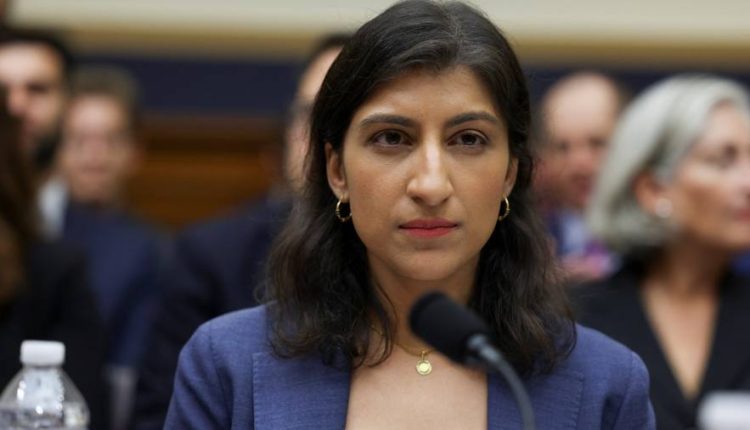Receive free Americas regulation updates
We’ll send you a myFT Daily Digest email rounding up the latest Americas regulation news every morning.
Mergers and acquisitions are Wall Street’s blood sport. Winning a deal is of paramount importance. So anyone who gets in the way of achieving that goal draws ire.
That is one reason why top US antitrust enforcer Lina Khan has become such an antagonist for dealmakers and why they were rejoicing this month when Amgen reached a settlement with her agency, allowing the pharmaceutical company’s $28bn acquisition of Horizon Therapeutics to proceed.
In its first challenge to a pharmaceutical deal in more than a decade, Khan’s Federal Trade Commission had sought to block the deal, arguing greater market power would lead to higher prices for patients.
One leading corporate lawyer summed up the widely held view on the settlement on Wall Street, saying it would discredit Khan and the FTC. He added that it would be harder for the former Columbia professor to win future cases especially as the Amgen settlement comes after failing to block in court Microsoft’s $75bn acquisition of Activision and Meta’s takeover of virtual reality fitness app maker Within.
There’s no doubt that the recent defeats are a setback for Khan, who was appointed by US president Joe Biden in 2021 with a mandate to revive the FTC to its trustbusting origins. And they come before a big looming showdown — a FTC lawsuit against Amazon expected to be launched later this month. But the reality of the Amgen settlement may be somewhat more complex than the Wall Street summation.
“The FTC’s record in court and by settlement is by no means a defeat for chair Khan’s tenure,” says Eleanor Fox, an expert in competition policy and professor at New York University School of Law. “Amgen was not a defeat at all. It was a settlement, and the FTC got restrictions that it wanted. It did not get to enjoin the merger, but that partial victory is the nature of a settlement.”
In Amgen’s case, the FTC argued that the Big Pharma group could get buyers to favour Horizon’s drugs by bundling them with its own best medicines. Under the resolution, Amgen promised not to bundle two of Horizon’s drugs.
Fox adds that a few court losses for the FTC or the Department of Justice are not a black mark either. “Our antitrust law is very conservative, making it hard for plaintiffs to win, and the FTC — and DOJ — are fighters to try to push back a very long, very big-business-friendly orientation.”
James Keyte, director of the Fordham Competition Law Institute, also points to Khan’s longer-term aims. “She uses litigation, if necessary, as a platform to try and return, in her view, antitrust law to its original purpose of preventing industry consolidation or post-merger abuse,” he says.
A contrary view is from William Kovacic, an academic who chaired the FTC under Republican president George W Bush. He says that the outcome of the Amgen dispute was an example of ambition being tempered by realism. But he adds that the FTC under Khan had previously been reluctant to settle due to fears that antitrust restrictions often fail to preserve competition. So the settlement could weaken the agency’s position in future battles.
“If an agency takes a very hard line on settlements, it must be prepared to litigate to the finish. If you cannot demonstrate your ability to prevail, a larger number of companies will take you on and ask the court to consider the settlement terms that the agency rejected,” says Kovacic. “This has proven to be a successful strategy for the merging parties in Meta/Within, and Microsoft/Activision.”
And it is the hope of dealmakers. Dealmaking volume — in dollar terms — has fallen significantly since she became chair of the FTC but the overall number of transactions is above average over the past decade. What that shows is that big companies have shied away from doing mega deals but smaller acquisitions have gone ahead as they probably posed less of a threat.
Consequently, anybody talking to dealmakers over the past year or so will have noticed that barely anyone has been capable of hiding their loathing for Khan. In private, financiers accuse her of being anti-American and against business. Several Wall Street donors to the Democratic Party are using their position of influence to quietly lobby Biden to drop Khan if he gets re-elected, according to people briefed on the matter. That’s how badly they want her out of the FTC.
Khan has an egalitarian vision of competition law that seeks to improve the wellbeing of citizens beyond their roles as consumers. The animus towards her in finance and corporate America might indicate she is having an impact despite the setbacks. The Amazon case will be a big test.
Twitter: @JFK_America
Read the full article here

